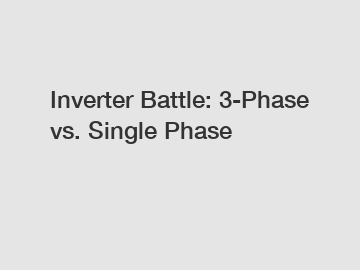Inverter Battle: 3-Phase vs. Single Phase
Welcome to the electrifying clash of power distribution systems in the world of inverters! Whether you're a technology enthusiast, an industrial professional, or a homeowner looking to optimize your energy consumption, understanding the difference between 3-phase and single-phase inverters is crucial. In this blog, we delve into the intricacies of these two battling solutions, exploring their features, benefits, and ideal applications. Join us on this thrilling journey as we decipher which contender stands victorious in the inverter arena.
Section 1: What are 3-Phase and Single-Phase Power Systems? (140 words).
To comprehend the duel between 3-phase and single-phase inverters, let's first understand their foundations. Single-phase systems operate with a single alternating current (AC) waveform, commonly found in household electrical installations. On the other hand, 3-phase systems utilize three separate AC waveforms, each out of phase with the others by 120 degrees. This not only enhances power transmission efficiency but also enables balanced power distribution across a network.

Section 2: Strengths and Applications of Single-Phase Inverters (165 words).
Single-phase inverters have long been the go-to choice for residential buildings, small commercial setups, and standalone applications. They offer simplicity, affordability, and easy integration with existing electrical systems. Perfect for powering home appliances and small electronics, single-phase inverters deliver relatively lower power output, typically up to 7.5 kW. Their size, lightweight nature, and affordable price point make them convenient for homeowners seeking renewable energy solutions.
Section 3: Advantages and Applications of 3-Phase Inverters (180 words).
For larger-scale operations, industrial facilities, and commercial settings, 3-phase inverters boast significant advantages. The synchronized and phased power distribution they enable facilitates efficient operation of heavy machinery, motors, and high-power equipment. With power outputs extending beyond 10 kW, 3-phase inverters ensure reliable and balanced delivery of electricity, minimizing voltage sags and enabling smooth operation. They possess higher fault tolerance, better harmonic cancellation, and reduce electrical losses, making them ideal for energy-intensive environments.
Section 4: Efficiency and Power Quality Comparison (140 words).
When comparing efficiency and power quality, the 3-phase inverter truly shines. By distributing power across three separate phases, this system reduces the overall current flow, subsequently minimizing transmission losses. Additionally, the balanced waveform of a 3-phase inverter ensures a consistently smooth power supply, reducing voltage fluctuations and harmonic distortion when compared to a single-phase inverter. Consequently, 3-phase inverters are better equipped to handle demanding, high-capacity applications without compromising on stability or energy efficiency.
Conclusion (48 words).
In the inverter battle of 3-phase versus single-phase, there is no one-size-fits-all solution. While single-phase inverters offer simplicity and cost-effectiveness for residential use, 3-phase inverters excel in industrial and commercial applications, providing superior power distribution and stability. Choose wisely, based on your energy needs and the scale of your operations.
Contact us to discuss your requirements of solar inverter efficiency, commercial inverter systems, on grid inverter manufacturer. Our experienced sales team can help you identify the options that best suit your needs.
185
0
0

Comments
All Comments (0)